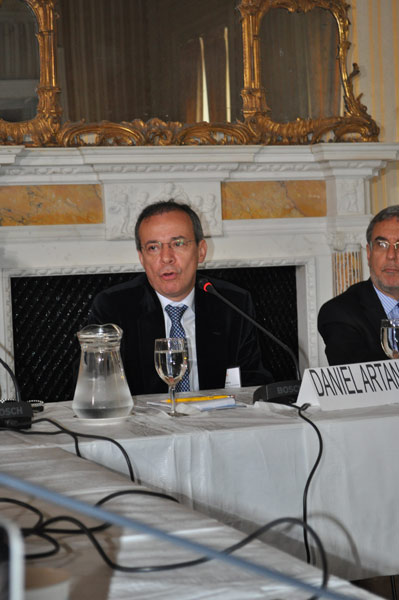More China investment won't change Argentina's economy: Economist
 |
|
Daniel Artana, a chief economist with the Latin American Economic Research Foundation (FIEL), addresses an audience at the Americas Society/Council of the Americas in Manhattan. Artana was one of three FIEL chief economists who discussed the outlook for Argentina's economy [Photo by MICHAEL BARRIS/CHINA DAILY] |
An increase in foreign direct investment from China would not change the outlook for Argentina's economy, an economist with a Latin American think-tank said.
"Any FDI is positive for the (Argentine) economy, but I don't think that in the short term it will change our outlook," Daniel Artana, a chief economist with the Latin American Economic Research Foundation (FIEL), told an audience at the Americas Society/Council of the Americas in Manhattan.
Bour said Argentina will face high inflation and unemployment in 2014 as the country grapples with a "mild recession".
After a decade of robust growth, Argentina's economy stumbled this year. Many economists have predicted no growth or even a recession in 2014. Meanwhile, March inflation rose 2.6 percent from a year earlier, the government said.
Early this year, Jorge Capitanich, chief of the Cabinet of Ministers, said Argentina seeks to further strengthen relations with China, its second-largest trading partner. Following his discussions with Chinese Ambassador to Argentina Yin Hengmin, Capitanich said a government objective is "promoting foreign direct investment from Chinese investors" and generating "conditions of sustainability for trade between the two countries." Argentina's trade deficit with China last year was $4.071 billion. The South American country is China's sixth largest Latin American trading partner.
Artana was one of three FIEL chief economists who discussed the outlook for Argentina's economy at the AS/COA's offices in Manhattan on May 9.
Artana spoke about the government's economic policy while Juan Luis Bour talked about the country's mild recession and impending high inflation and Santiago Urbiztondo discussed the government's moves to reduce subsidies without regulatory reform.
While Argentina's lackluster economic growth concerns economists in the country, China's slowdown also has many worried. A sharp drop in growth could severely impact demand in China for commodities such as the soybeans which Argentina exports to the Asian nation. Argentina is the world's third-largest soybeans exporter.
China's GDP grew 7.7 percent in the final quarter of 2013. The government's 2014 growth target is 7.5 percent as the world's second-largest economy transitions to a consumption and services driven model from export and investments after years of fast-paced expansion.
Although China's GDP expanded by a better than expected 7.4 percent in the first quarter, forecasts for China's growth in the months and years ahead are lower.
Michael Pettis, an often quoted Beijing-based China observer, has predicted that China's GDP growth will slow to 4 to 5 percent in the next 10 years. Economist Paul Krugman also has said he is very worried about the indirect and unanticipated effects of a China downturn. Economists also are concerned about China's rising debt load dragging on growth.
Artana acknowledged that Argentina and other nations that produce commodities for China are at risk from a China economic slowdown. China and Argentina have been strategic partners since 2004. In 2012, the countries' two-way trade amounted to about $14.5 billion.
Reflecting the increasing importance of China's expertise and financial support to Argentina, Gerardo Ferreyra, vice president of the Electroingenieria (Eling) construction company told Xinhua that China's aid has helped the South American country save over $10 billion annually in energy imports.
Eling and China Gezhouba (Group) Corp are jointly building two hydroelectric dams in Argentina's southern Santa Cruz province. The construction of the Nestor Kirchner and Jorge Cepernic dams is part of a $4.7 billion-dollar project financed by the China Development Bank (CDB) and insurance firm China Export & Credit Insurance Corp (Sinosure).
michaelbarris@chinadailyusa.com




















